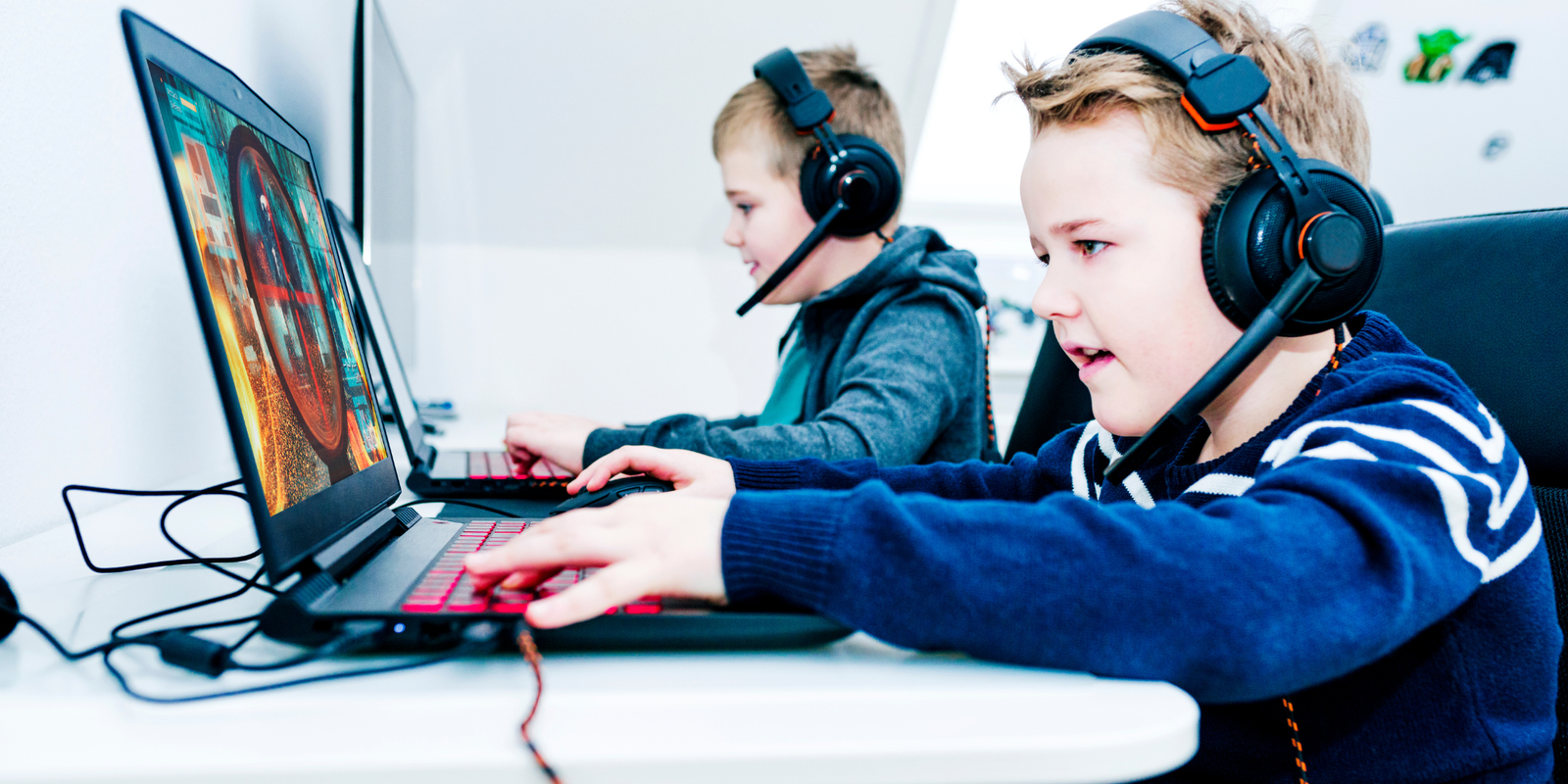Video games have become an integral part of modern childhood, often sparking debate among parents, educators, and researchers about their effects. While concerns persist about potential drawbacks, video games also offer several benefits that can aid in a child’s development. This blog explores the multifaceted impact of video games on children, addressing both the positive and negative aspects.
Benefits of Playing Video Games for Kids
Video games have evolved significantly over the past few decades, becoming a staple in many children’s lives. While they often face criticism, it’s important to recognize the array of benefits they can offer when integrated thoughtfully into a child’s routine. Below, we explore the various ways in which video games can positively impact children’s development.
1. Cognitive Skills Enhancement
Problem-Solving and Logic
Many video games are designed to challenge players with puzzles and complex scenarios. Games like “The Legend of Zelda” or “Portal” require players to think critically and strategically to progress. This constant engagement with problem-solving activities can enhance a child’s ability to think logically and develop solutions to challenges they face in real life.
Hand-Eye Coordination
Action games, particularly those that require precise movements and quick reflexes, can significantly improve hand-eye coordination. For instance, games like “Fortnite” or “Call of Duty” demand quick and accurate responses to dynamic environments, which can help children develop better motor skills and reaction times.
2. Educational Value
Learning Through Play
Educational games transform learning into an interactive and enjoyable experience. Games like “Math Blaster” or “Brain Age” make subjects like math, language, and science more engaging. By incorporating educational content into a gaming format, these games can help children grasp difficult concepts more easily and retain information better.
Creativity and Imagination
Sandbox games such as “Minecraft” or “The Sims” allow children to express their creativity by building and designing their own worlds and scenarios. These games encourage imaginative play, giving children the freedom to experiment and innovate, which can translate to better creative thinking skills in other areas of their lives.
3. Social Skills Development
Teamwork and Cooperation
Multiplayer games often require players to work together to achieve common goals. Games like “Overwatch” or “Among Us” promote teamwork and cooperation, as players must communicate and strategize to succeed. These experiences can help children develop strong social skills and the ability to work effectively in a team, which are essential for their future personal and professional lives.
Cultural Awareness
Online gaming platforms connect children with peers from different parts of the world. This interaction exposes them to diverse cultures and perspectives. Through games, children can learn about global diversity and develop a sense of empathy and understanding towards others, fostering a more inclusive worldview.
4. Emotional Resilience
Persistence and Patience
Many video games are designed to be challenging, requiring players to persist through difficult levels or complex tasks. Games like “Dark Souls” or “Celeste” are notorious for their difficulty, teaching children that persistence and patience are key to overcoming obstacles. These lessons can help children develop a resilient mindset, important for facing real-world challenges.
Stress Relief
Gaming can serve as a healthy outlet for stress and anxiety. Engaging in fun and immersive game worlds can provide a temporary escape from daily pressures, helping children relax and unwind. Games that offer a sense of achievement and progression, such as “Animal Crossing” or “Stardew Valley,” can also boost mood and provide a sense of accomplishment.
When integrated into a balanced lifestyle, video games can offer numerous benefits for children’s development. They can enhance cognitive skills, provide educational value, develop social skills, and build emotional resilience. Recognizing these benefits helps shift the narrative around video games, highlighting their potential as valuable tools for learning and growth. However, it’s crucial to ensure that gaming is part of a well-rounded routine that includes physical activity, social interaction, and other forms of learning. With thoughtful guidance and moderation, video games can play a positive role in a child’s development journey.
Disadvantages and Risks of Children Playing Video Games
While video games can offer numerous benefits, it is equally important to acknowledge the potential disadvantages and risks associated with them. Excessive gaming or exposure to inappropriate content can have negative effects on a child’s physical health, mental well-being, academic performance, and social life. Understanding these risks can help parents and guardians make informed decisions about their child’s gaming habits.
1. Physical Health Issues
Sedentary Lifestyle
One of the most significant concerns with video gaming is its contribution to a sedentary lifestyle. Children who spend excessive amounts of time playing video games are at risk of not getting enough physical exercise. This lack of activity can lead to obesity, cardiovascular issues, and other health problems associated with a sedentary lifestyle. Encouraging regular breaks and physical activity is crucial to mitigating these risks.
Eye Strain and Posture Problems
Prolonged screen time can lead to eye strain, commonly referred to as “computer vision syndrome.” Symptoms include headaches, blurred vision, and dry eyes. Additionally, poor posture while gaming can result in musculoskeletal issues such as neck and back pain. It is important for children to take regular breaks, maintain proper posture, and ensure their gaming setup is ergonomically sound to avoid these physical health problems.
2. Mental Health Concerns
Addiction
Gaming addiction is a growing concern, especially with the immersive nature of modern video games. Children may become so engrossed in gaming that they neglect other aspects of their lives, such as homework, hobbies, and social interactions. This can lead to a decline in overall well-being and can be difficult to address without professional help. Setting time limits and monitoring gaming habits are essential in preventing addiction.
Aggressive Behavior
Exposure to violent video games has been linked to increased aggression and desensitization to violence in some children. Games that involve realistic and graphic violence can affect a child’s perception of acceptable behavior, potentially leading to increased aggression and conflicts with peers. It is important for parents to be aware of the content of the games their children are playing and to guide them towards age-appropriate options.
3. Academic Performance
Distraction from Studies
Excessive gaming can interfere with academic responsibilities. Children who prioritize gaming over their studies may experience a decline in their academic performance. Homework, reading, and other educational activities may be neglected in favor of gaming, leading to poorer grades and a lack of engagement in school.
Sleep Disruption
Playing video games late into the night can disrupt a child’s sleep patterns. The excitement and stimulation from gaming can make it difficult for children to wind down and fall asleep, resulting in insufficient rest. Poor sleep quality can affect cognitive functions, mood, and overall health, further impacting academic performance and daily life.
4. Exposure to Inappropriate Content
Violence and Explicit Material
Not all video games are suitable for children. Some games contain violent or explicit content that can be harmful to young minds. Exposure to such content can lead to nightmares, anxiety, and inappropriate behavior. Parents should carefully review game ratings and content to ensure they are suitable for their child’s age and maturity level.
Online Predators
Online gaming exposes children to interactions with strangers, which can pose safety risks. Predators may use gaming platforms to contact and exploit children. Educating children about online safety, monitoring their interactions, and using privacy settings can help protect them from such dangers.
5. Cyberbullying
Harassment and Bullying
Online gaming environments can sometimes be hostile, with instances of harassment and bullying. Children may encounter abusive language, threats, or exclusion from groups, which can affect their mental health and self-esteem. Encouraging open communication about their gaming experiences and teaching them how to handle cyberbullying are important steps in protecting their well-being.
While video games can be a source of entertainment and learning, they also pose significant risks that need to be managed carefully. Parents and guardians play a crucial role in guiding children’s gaming habits, ensuring they balance gaming with other important activities and protect themselves from potential harms. By being aware of the disadvantages and risks associated with video games, families can take proactive steps to create a healthy and safe gaming environment.
Impact on Brain and Mental Health
Video games have a profound impact on the brain and mental health of children, with effects that can be both positive and negative. Understanding these impacts can help parents, educators, and healthcare professionals support children’s well-being and development in a balanced manner.
1. Positive Effects
Enhanced Cognitive Functions
Attention and Focus
Video games often require sustained attention and quick decision-making, which can enhance a child’s ability to focus and concentrate. Games that involve tracking multiple objects, such as “StarCraft” or “League of Legends,” train players to manage various tasks simultaneously and prioritize important information, potentially improving multitasking skills.
Spatial Skills
Games that involve navigation and spatial reasoning, such as “Minecraft” or “Tetris,” can improve spatial awareness and skills. These games require players to understand and manipulate objects in a three-dimensional space, which can translate to better performance in tasks that require spatial cognition, such as mathematics and engineering.
Memory Enhancement
Many video games require players to remember complex instructions, maps, and sequences. Games like “The Legend of Zelda” series demand that players keep track of various quests, locations, and items, which can improve both short-term and long-term memory.
Mood Improvement
Stress Reduction
Engaging in video games can serve as a form of relaxation and stress relief. Games that provide a sense of escapism and immersion, such as “Animal Crossing” or “Journey,” can help children decompress and temporarily disconnect from real-life pressures. This can result in improved mood and reduced anxiety levels.
Sense of Achievement
Video games often provide immediate feedback and rewards for accomplishing tasks, which can boost self-esteem and motivation. The sense of achievement from completing a difficult level or obtaining a rare item can enhance a child’s confidence and perseverance in other areas of life.
2. Negative Effects
Addictive Behavior
Dopamine Overload
Video games are designed to be engaging and rewarding, which can lead to the overstimulation of the brain’s reward system. This overstimulation can cause an increase in dopamine levels, which is associated with pleasure and reinforcement of behaviors. Over time, children may seek the constant stimulation that games provide, leading to addictive behaviors and a preference for gaming over other activities.
Neglect of Responsibilities
Addiction to video games can lead children to neglect important responsibilities such as schoolwork, chores, and social interactions. This can result in academic decline, poor personal relationships, and an overall imbalance in their daily lives.
Increased Stress and Anxiety
Competitive Pressure
Many video games involve competitive elements, which can create stress and anxiety, especially if children feel pressured to perform well. Games like “Fortnite” or “Overwatch” often have ranking systems and social comparisons, which can lead to feelings of inadequacy or frustration when expectations are not met.
In-Game Failures
Repeated failures or difficulties in progressing through games can lead to increased frustration and stress. Games that are particularly challenging, such as “Dark Souls” or “Sekiro,” can sometimes cause players to experience heightened levels of anxiety, impacting their overall mental health.
3. Long-Term Brain Changes
Structural Changes
Research has shown that extensive gaming can lead to structural changes in the brain. For example, studies have found that the areas of the brain associated with attention and visuospatial skills may become more developed in frequent gamers. However, these changes are not universally positive and can depend on the type and amount of gaming.
Impact on Neuroplasticity
Video games can influence neuroplasticity, the brain’s ability to reorganize itself by forming new neural connections. While this can be beneficial for learning and adapting to new challenges, excessive gaming may lead to an over-reliance on the neural pathways associated with gaming at the expense of those used for other important activities, such as reading or physical exercise.
The impact of video games on the brain and mental health is multifaceted, offering both benefits and drawbacks. While video games can enhance cognitive functions, improve mood, and provide stress relief, they also carry risks of addiction, increased stress, and negative long-term brain changes. Parents and guardians must monitor their children’s gaming habits, ensuring a balanced approach that maximizes the positive effects while minimizing potential harms. By fostering a healthy gaming environment, children can enjoy the benefits of video games without compromising their mental health and overall development.
Positive and Negative Effects of Online Games on Children
Online games have become increasingly popular among children, offering unique opportunities for social interaction and skill development. However, they also present a range of potential risks and negative effects. Understanding both sides can help parents and guardians guide their children towards a healthy and safe gaming experience.
Positive Effects
Social Interaction
Building Friendships
Online games can be a social platform where children meet and interact with peers, often forming friendships that extend beyond the virtual world. Multiplayer games like “Fortnite” or “Roblox” allow children to collaborate, compete, and communicate with others, fostering social bonds.
Teamwork and Collaboration
Many online games require players to work together to achieve common goals. Games such as “Overwatch” or “Among Us” emphasize teamwork, strategy, and communication. These experiences can help children develop essential collaborative skills that are valuable in academic and professional settings.
Skill Development
Strategic Thinking
Online strategy games, such as “Clash of Clans” or “League of Legends,” require players to plan, strategize, and make quick decisions. These games can enhance critical thinking and strategic planning skills, which are beneficial for problem-solving in real-life situations.
Multitasking and Time Management
Games that require managing multiple tasks simultaneously, like “World of Warcraft” or “StarCraft,” can improve a child’s ability to multitask and manage time effectively. These skills are transferable to various aspects of life, including school and extracurricular activities.
Cultural Awareness
Exposure to Global Communities
Online gaming connects children with peers from different cultures and backgrounds. This exposure can broaden their understanding and appreciation of cultural diversity. Games with global communities, such as “Minecraft” or “Fortnite,” allow children to interact with players from around the world, fostering a sense of global citizenship and empathy.
Negative Effects
Privacy Risks
Personal Information Exposure
Online games often require the creation of user profiles, which can include personal information. Children may inadvertently share sensitive information that could be misused by others. Ensuring that privacy settings are properly configured and educating children about the importance of keeping personal information private are critical measures to safeguard their online presence.
Cybersecurity Threats
Online games can be targets for cyber-attacks, including hacking and phishing. Children may encounter malicious links or downloads that could compromise their devices and personal data. Teaching children about online safety and the importance of avoiding suspicious links or downloads is essential to protect against these threats.
Exposure to Inappropriate Behavior
Toxicity and Harassment
The competitive nature of online games can sometimes lead to toxic behavior and harassment. Children may encounter rude or aggressive players who use offensive language or engage in bullying. This negative environment can affect their self-esteem and mental health. Encouraging children to report inappropriate behavior and use mute/block functions can help mitigate these issues.
Exposure to Explicit Content
Some online games may expose children to inappropriate content, such as violence, explicit language, or adult themes. Monitoring the games children play and setting parental controls can help ensure they are engaging with age-appropriate content.
Risk of Addiction
Compulsive Gaming
The immersive nature of online games can lead to compulsive gaming behavior. Children may find it difficult to stop playing, leading to excessive screen time and neglect of other important activities, such as homework, physical exercise, and family time. Setting time limits and encouraging a balanced lifestyle can help prevent gaming addiction.
Impact on Academic Performance
Excessive time spent on online games can interfere with academic responsibilities. Children who prioritize gaming over studying may experience a decline in academic performance. Establishing clear rules about gaming time, particularly on school nights, can help maintain a healthy balance between gaming and academics.
Mental Health Issues
Anxiety and Stress
The competitive aspects of online gaming can contribute to anxiety and stress, especially if children feel pressured to perform well. Repeated failures or negative interactions can exacerbate these feelings. Encouraging a positive gaming experience and helping children manage their emotions can reduce the mental health risks associated with online gaming.
Online games offer both positive and negative effects on children, influencing their social skills, cognitive development, and overall well-being. By fostering a balanced approach to gaming, parents and guardians can help children reap the benefits of online games while minimizing potential risks. Monitoring gaming habits, setting appropriate boundaries, and promoting open communication about online experiences are key strategies in ensuring that online gaming remains a positive and enriching activity for children.
Balancing the Pros and Cons
Balancing the benefits and drawbacks of video games is essential for ensuring that children can enjoy the positive aspects of gaming while minimizing potential harms. This chapter provides practical strategies for parents, educators, and caregivers to create a healthy gaming environment that promotes overall well-being.
Establishing Healthy Gaming Habits
Setting Time Limits
Consistent Schedules
Establishing clear and consistent gaming schedules helps children balance gaming with other important activities such as homework, physical exercise, and family time. Parents can use tools like timers or parental control apps to enforce these limits. For example, limiting gaming to one hour on weekdays and two hours on weekends can help prevent excessive screen time.
Breaks and Physical Activity
Encouraging regular breaks during gaming sessions can prevent physical strain and promote better health. Incorporating physical activities such as outdoor play, sports, or exercise routines helps counteract the sedentary nature of gaming. For instance, implementing a rule that children must take a 10-minute break after every hour of gaming can promote better posture and eye health.
Choosing Appropriate Games
Age-Appropriate Content
Understanding Game Ratings
Familiarizing oneself with game rating systems, such as the Entertainment Software Rating Board (ESRB) or Pan European Game Information (PEGI), helps parents choose games that are suitable for their child’s age and maturity level. These ratings provide information about the content and age-appropriateness of games.
Research and Reviews
Reading reviews and researching games before purchase ensures that the content aligns with family values and expectations. Websites like Common Sense Media offer detailed reviews and ratings based on educational value, violence, language, and other factors.
Educational and Skill-Building Games
Incorporating Learning
Selecting games that have educational value or promote skill-building can enhance the positive impact of gaming. Educational games like “Zoombinis” or “DragonBox” can make learning fun and interactive, while games that develop creativity, such as “LittleBigPlanet,” encourage innovation and problem-solving.
Encouraging Social Interaction
Family Gaming
Playing Together
Participating in video games as a family activity can strengthen bonds and provide opportunities for parents to guide their children’s gaming experiences. Cooperative games or multiplayer games like “Mario Kart” or “Minecraft” can be enjoyed together, fostering teamwork and communication.
Discussing Game Content
Engaging in conversations about the games children play helps parents understand their interests and address any concerns. Discussing in-game scenarios and decisions can teach children critical thinking and ethical considerations.
Offline Activities
Balanced Social Life
Encouraging children to participate in offline social activities, such as clubs, sports, or playdates, ensures that they develop well-rounded social skills. Balancing online and offline interactions helps children build meaningful relationships and prevents social isolation.
Monitoring and Guidance
Privacy and Safety
Online Safety Education
Teaching children about online safety is crucial for protecting their privacy and well-being. Children should understand the importance of not sharing personal information, recognizing suspicious behavior, and using privacy settings effectively. Regular discussions about online interactions can reinforce safe practices.
Parental Controls
Utilizing parental control features on gaming consoles, computers, and mobile devices helps parents monitor and manage their children’s gaming activities. These controls can restrict access to certain games, set time limits, and monitor online interactions.
Open Communication
Building Trust
Maintaining open lines of communication with children about their gaming experiences fosters trust and allows parents to provide guidance and support. Encouraging children to share their gaming achievements and challenges can help parents understand their perspective and address any issues collaboratively.
Promoting Emotional and Mental Well-Being
Managing Stress and Anxiety
Healthy Gaming Environment
Creating a positive and supportive gaming environment reduces the risk of stress and anxiety associated with competitive games. Encouraging a balanced approach to gaming, where fun and relaxation are prioritized over competition, can improve mental health.
Emotional Regulation
Teaching children techniques for managing emotions, such as deep breathing, mindfulness, or taking breaks, can help them cope with the frustrations and challenges of gaming. Parents can model these behaviors and provide reassurance when children face in-game difficulties.
Balancing the pros and cons of video games involves a combination of setting boundaries, choosing appropriate content, encouraging diverse activities, and maintaining open communication. By taking a proactive approach, parents and caregivers can ensure that video games remain a positive and enriching part of children’s lives. This balanced approach helps children develop the skills and resilience needed to navigate the digital world while maintaining their overall health and well-being.
Conclusion
Video games are a double-edged sword, offering significant benefits while also posing risks. By understanding these impacts and implementing balanced gaming habits, parents can help children enjoy the positive aspects of gaming while mitigating potential negative effects. The key lies in moderation, supervision, and choosing the right types of games.
[As an Amazon Associate, I earn from qualifying purchases at no additional cost to you.]









